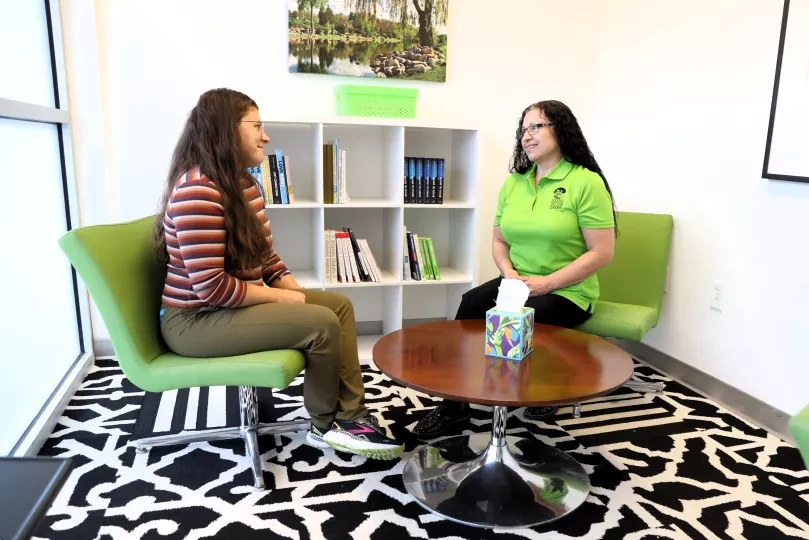Recuperación de adicciones tras los muros de la prisión

Publicado el 20 de octubre de 2025
Tras los muros de la prisión, Lorie Seeking Land tomó todos los cursos que pudo. Aprendió a administrar su dinero para poder llamar a sus seres queridos. Empezó a ir al gimnasio, a escribir un diario y a elaborar un plan a cinco años.
Más de ocho años después, ha vuelto a estar tras esos mismos muros, ayudando a otras mujeres a aprender a quererse a sí mismas y a planificar su vida después de la liberación.
“Les ayudo a reconocer cómo mejorar sus vidas”, dijo Lorie. “Cuando veo que se les enciende la bombilla, es maravilloso presenciar ese pequeño destello de esperanza y la certeza de que pueden lograrlo. Solo quieren que alguien los vea, los escuche y los acepte tal como son.”
Como parte de una subvención de cuatro años otorgada al Centro de Innovación de Práctica Comunitaria de la Universidad Estatal de Dakota del Sur, Lorie comenzó a principios de este año un programa de tutoría individual entre pares en la prisión de mujeres de Dakota del Sur.
“Es como si estuvieran esperando a que alguien los viera y les hiciera esas preguntas difíciles. Son cosas de las que no pueden hablar con nadie más”, dijo. “Puedo ver el alivio en sus cuerpos simplemente al escuchar sus historias.”
El proyecto permite al equipo de Face It TOGETHER trabajar en estrecha colaboración con START-SD, South Dakota Department of Corrections, Brothers and Sisters Behind Bars y St. Dysmas para compartir la atención integral para el bienestar en materia de adicciones en todo el estado.
“Al brindar apoyo a las personas antes y después de su liberación, podemos facilitar esa transición y ayudarlas a prosperar en cualquier comunidad de Dakota del Sur que elijan”, dijo Megan Colwell, directora ejecutiva de Face It TOGETHER. “Esta subvención representa una importante oportunidad para reducir la reincidencia y ayudar a que las personas se recuperen.”
Pronto, Nick Pappas, otro mentor de Face It TOGETHER, comenzará el mismo proceso en la prisión estatal Mike Durfee en Springfield y en el Centro de Mínima Penitenciaría de Yankton en Yankton.
Lorie ya ha constatado una gran demanda de apoyo en el centro de Pierre y espera poder ayudar a aún más mujeres.
“Puedo decir que tenemos muchísimas mujeres interesadas en este proyecto. Podría ir de lunes a viernes y no verlas a todas”, dijo. “Lo que estamos haciendo debe estar funcionando, porque estas mujeres necesitan un espacio para expresarse”.
La mentora que necesitaba
Lorie es una sobreviviente de trauma sexual, adicción a las metanfetaminas y reinserción social tras su encarcelamiento. Después de cumplir su condena de 10 años de prisión, se dio cuenta de que no tenía un mentor que comprendiera por lo que estaba pasando. Ahora, ella tiene la oportunidad de ser esa mentora.
Lo primero que hace al reunirse con mujeres por primera vez es asegurarles que todo lo que hablen será confidencial. Comparte parte de su propia historia y las ayuda a visualizar un futuro esperanzador.
“Están aprendiendo a quererse a sí mismas con el paso de las semanas”, dijo. “Es importante que sepan que valen la pena. Merecen volver a empezar y tener una buena vida”.
Lorie ya ha notado una transformación en sus alumnas de coaching. Una mujer en particular se siente visiblemente más segura de sí misma semana tras semana.
“La primera vez que hablé con ella, no se estaba cuidando. La segunda vez que vino, llevaba el pelo trenzado. La tercera vez, estaba maquillada y llevaba trenzas francesas”, dijo. “Pude notar un cambio muy positivo en ella. Estaba feliz y tenía esperanza. Tengo grandes expectativas puestas en ella en cuanto a amor propio, autoestima y confianza.”
Cuando Lorie reflexiona sobre su tiempo en prisión, piensa en las mujeres que fueron su apoyo. Jugaban al Uno afuera, en una de las codiciadas mesas de picnic a la sombra, y se ayudaban mutuamente. Se fijaron metas, compartieron sellos e incluso llamaron por teléfono a los familiares de los demás.
“Las películas de prisiones no muestran realmente a la gente buena ni lo que hacen”, dijo. “Todo se centra en las peleas y el drama, no en las personas que construyen sus vidas tras los muros. Una de esas mujeres abrió un restaurante; otra recuperó la custodia de sus hijos y montó una guardería. Los sueños se hacen realidad al salir de la cárcel."
Un elemento importante del trabajo de Lorie consiste en ayudar a las mujeres a prepararse para los factores desencadenantes del estrés y la adicción fuera de la cárcel.
“Una vez que sienten que han sido escuchados, comenzamos a elaborar un plan”, dijo. “Les hago preguntas prácticas y personales para ayudarlos a tener éxito. ‘¿A quién vas a llamar cuando necesites que te recojan? ¿Quiénes son tus personas de confianza? ¿Cuál es su estrategia de salida? ¿Cuáles son los lugares seguros para trabajar? Creamos una rueda de seguridad y analizamos los escenarios con los que probablemente se encontrarán."
Lorie anima a las mujeres que están en prisión a escribir la historia de su día perfecto una vez liberadas. Esas historias le dan esperanza y la ayudan a imaginar un movimiento de mujeres que compartan sanación y bienestar después del encarcelamiento.
“Empiezan desde el momento en que se despiertan y usan sus propios productos, se peinan, todas esas pequeñas cosas que no tienen en prisión”, dijo. Describen el reencuentro con sus hijos y llevarlos al parque. Sonríen al leer lo que han escrito. Si visualizan ese día perfecto, intentarán conseguirlo.
